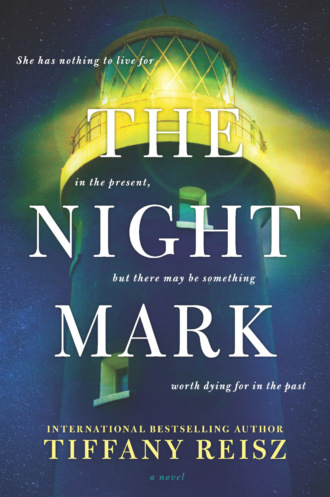
Полная версия
The Night Mark

From the bestselling author of The Bourbon Thief comes a sweeping tale of loss and courage, where one woman discovers that her destiny is written in sand, not carved in stone.
Faye Barlow is drowning.
After the death of her beloved husband, Will, she cannot escape her grief and most days can barely get out of bed. But when she’s offered a job photographing South Carolina’s storied coast, she accepts. Photography, after all, is the only passion she has left.
In the quaint beach town, Faye falls in love again when she sees the crumbling yet beautiful Bride Island lighthouse and becomes obsessed with the legend surrounding The Lady of the Light—the keeper’s daughter who died in a mysterious drowning in 1921. Like a moth to a flame, Faye is drawn to the lighthouse for reasons she can’t explain. While visiting it one night, she is struck by a rogue wave and a force impossible to resist drags Faye into the past—and into a love story that is not her own.
Fate is changeable. Broken hearts can mend. But can she love two men separated by a lifetime?
Praise for Tiffany Reisz’s The Bourbon Thief
“A dark, twisty tale of love, lust, betrayal, and murder...this novel is not one to be missed.”
—Bustle
“I loved [Reisz’s] Original Sinners series, and this book looks like an epic to delve into on a long, lazy afternoon. Her prose is quite beautiful, and she can weave a wonderful tight story.”
—New York Times and USA TODAY bestselling author Jennifer Probst
“The Bourbon Thief isn’t just good, it’s exceptional. The story captured my imagination; the characters captured my heart.”
—Literati Literature Lovers
“Reisz fills the narrative with rich historic details; memorable, if vile, characters; and enough surprises to keep the plot moving and readers hooked until the final drop of bourbon is spilled.”
—Booklist
“Beautifully written and delightfully insane...Reisz vividly captures the American South with a brutal honesty that only enhances the dark material.”
—RT Book Reviews, Top Pick
“Impossible to stop reading.”
—Heroes and Heartbreakers
“The Bourbon Thief is the sort of book that knocks you off your feet, steals your sanity and keeps you up all night reading! Fair warning—this is definitely a nontraditional love story... Not for the faint of heart!”
—RT Book Reviews
“Prepare yourself for soap-operatic level twists, and also to ignore everything else in your life as you race to the end of this eyebrow-raising tale.”
—RT Book Reviews
The Night Mark
Tiffany Reisz

www.mirabooks.co.uk
To the men and women who tended the world’s lighthouses and to everyone who ever kept a light shining in the dark...
Contents
Cover
Back Cover Text
Praise
Title Page
Dedication
Chapter 1
Chapter 2
Chapter 3
Chapter 4
Chapter 5
Chapter 6
Chapter 7
Chapter 8
Chapter 9
Chapter 10
Chapter 11
Chapter 12
Chapter 13
Chapter 14
Chapter 15
Chapter 16
Chapter 17
Chapter 18
Chapter 19
Chapter 20
Chapter 21
Chapter 22
Chapter 23
Chapter 24
Chapter 25
Chapter 26
Chapter 27
Author’s Note
Extract
Copyright
1
Faye closed her eyes and thought of Casablanca.
Easy to do since she’d been watching it earlier that day. She’d also watched it the week before and the month before that. In the past four years, she’d watched it at least ten times, definitely more, but ten was all she would admit to if asked. And her husband had asked when he’d come home from work and found her watching it.
“Again?” Hagen had asked.
“It’s a classic” was all Faye had said.
Now, hours later, as Hagen kissed the back of her neck, her thoughts returned to Casablanca. It was nine o’clock on Friday night, the one hour of the week they usually made the effort to show up for their marriage. But she hadn’t felt well all day—tired, aching—and all she wanted to do was close her eyes and go to sleep. Since she couldn’t sleep, she dreamed of Rick and Ilsa and Morocco while Hagen did his best to pretend theirs was a real marriage.
Faye was far more concerned about Bogie’s Rick than Hagen. Had Rick ever found someone else to love or had he made a monk of himself, living in celibate devotion to his beloved Ilsa for the rest of his life? Or maybe he’d died shortly after Ilsa got on that plane, killed by fascists or Nazis on his way to Brazzaville with Louis. Faye hoped he had died. Better that than live for decades still in love with a woman he could never have again.
Whoever first said it was better to have loved and lost than never to have loved at all had neither loved nor ever lost.
But Faye had. She’d loved and she’d lost and as she lay in the bed of a man who didn’t love her any more than she loved him, she would have sold her soul to not have done either.
“Faye?” Hagen said in her ear. He’d been nice to her today, so she opened her eyes.
“Yes?”
“Your phone’s beeping.”
She reached for the phone on the bedside table and saw she had a text message.
Check your email asap
It was from Richard, her friend who owned the only decent camera store in Columbia, South Carolina. There was no good reason he would be emailing or texting her on a Friday night that she could think of and many bad reasons.
“Emergency text. I’ll be right back,” she told Hagen who immediately rolled onto his back and stared up at the ceiling, silently seething—as usual. Why did she even bother lying? He was always angry at her these days. She looked at him, looked at him longer than she meant to, longer than she had in a very long time. Wives of her husband’s coworkers called Hagen a “catch.” That he was handsome—brown hair, brown eyes, good body—was merely the smallest part of the equation. He was a good provider. That was what one of her neighbor ladies had called him, and here in the South, where men were still expected to be breadwinners, patriarchs and kings of the castle, that was the trump card. It didn’t matter that Hagen spent every free moment outside work golfing with his buddies, that he rarely spoke to her except to criticize how she’d spent her days and that the sole reason he was trying to have sex with her was so they could pretend they were happy together when they both knew better.
Faye shut the bathroom door and read her email.
Hey, Faye—I just had to cancel some work. Got too busy with weddings. If you’re interested, I’ll give them your name. The ladies of the Lowcountry Preservation Society need a photographer for their annual “Journey through Time” fund-raising calendar: $10,000 for 100 exclusives. Landscapes, beach scenes, historical houses, ladies in dresses, the usual old-timey tourist shit. Due date August 1. Yes or no?
Work.
A job offer.
She hadn’t expected that. She hadn’t taken on a professional photography assignment in almost four years. Last week she’d stopped by Richard’s camera shop to buy a replacement lens cap for her Nikon. It had fallen off during a walk two weeks ago and rolled into a gutter. She’d mentioned to Richard she missed going out on assignments. He’d told her to help him with his summer wedding load, and she’d simply smiled at him and said, “No, thanks. I don’t do weddings.”
But this job wasn’t a wedding.
Faye knew she’d been in the bathroom long enough she was risking a fight, and though she wasn’t scared of getting in a fight with Hagen, she was just too tired for it tonight. Out of guilt she made herself try to go. When she did, she discovered exactly why she’d been feeling so tired and miserable and aching all day.
To stall for time, Faye washed her hands. She washed them till they went pruny and then kept washing them. She washed them for so long she forgot why she was washing them. Once she’d read a phrase in a book—the valley of tears. She didn’t know where she’d read it, but she guessed the Bible. This was the moment she should go into that valley and find her tears. She wanted them. She needed them. In her heart she wandered through brambles and thorns and down a steep ravine and into the valley. At the bottom she found a river, where all her tears were supposed to be. The riverbed was dry. She had no more tears left.
She heard a soft knock on the bathroom door and started.
“Faye?”
“Yes?”
“It’s been ten minutes.” His voice was testy, impatient, his usual tone with her these days. All day every day.
Faye dried her hands and opened the door.
“Sorry,” she said.
He nodded and turned around. “I’m going back to bed. Hurry up, okay?”
Faye didn’t want to hurt Hagen; she truly didn’t. She didn’t want to hurt anyone, but there was no way to say it that wouldn’t hurt him.
So she hurt him.
“I’m bleeding.”
He stopped. His broad, powerful shoulders slumped and the air seemed to go out of his body like a balloon with a pinprick in it.
Slowly, he turned around.
“I’ll call Dr. Melzer.”
“Don’t call anybody.”
“But—”
“Don’t.” She couldn’t face any more doctors. She couldn’t face more pity, more sympathy, more tests, more shots, more touching parts of her she never wanted touched again.
He started toward her and she took a step back.
“Please don’t touch me,” she said. If she thought for one second he would hold her to comfort her, she might have let him. But he didn’t want to comfort her. Hagen wanted her to comfort him, and that she couldn’t do. She had nothing to give him.
“Faye?”
“I think I should just go to bed.”
His eyes looked black in the low light of the hallway. Her toes were cold on the hard bamboo floor. Where were her woolen socks? Hagen always kept the house so cold.
“You’re having another miscarriage, and you’re going to bed.” Hagen wasn’t asking her a question. He was registering his disgust with her.
“You have to be pregnant to have a miscarriage. It didn’t take,” she said. Hagen had begged, practically demanded, she try one more IUI procedure, and she’d agreed to it when he’d called it their “Hail Mary.” Well, they’d hailed Mary and Mary hadn’t hailed back.
“Do you have a fever?”
“No.”
“How heavy are you bleeding? Maybe it’s still—”
“It’s over, Hagen. It’s just... It’s all over.”
Somewhere in the valley, the tiniest trickle of water appeared in the riverbed, the tiniest trickle of water appeared on her face. She wiped it off immediately.
“Faye...please.”
“Don’t worry about me.”
“Don’t worry about you? You tell me you’re losing the baby, and I’m not supposed to worry about you?”
She returned to the bedroom, Hagen following her. The bedroom. Their bedroom. Their ridiculous bedroom. Hagen had picked out all the furniture. It looked like something from the Biltmore—king-size iron bed; chocolate-colored walls; brick fireplace; oversize espresso leather armchairs, artfully distressed, of course; gilt-frame landscape paintings on the wall picked out by the decorator by artists neither of them could name. It was a showroom more than a bedroom. Look how much money we have. Look at how sexy we are. Look at how glamorous our marriage is. She hated everything about the room except for the pillow-top mattress. Sleeping was her favorite pastime these days. She took her mattresses seriously.
“I wasn’t pregnant. It didn’t work. And even if I was, it’s not like you can do anything about it,” she said, climbing back into bed. She reached for her book. It would make a fine shield between them.
“What are you doing?”
“Reading.”
“You’re reading. While having a miscarriage.”
“I got my period. It is what it is.”
“You don’t care, do you? You don’t care that this is happening?”
“I can’t care,” she said.
“Why can’t you care?”
“Because if I let myself care about anything that happens to me, I wouldn’t be able to get out of bed.”
“You don’t get out of bed anyway.”
She sighed and met his gaze. He was looking at her, eyes boring into her. Did he see her at all? Or did he just see what he wanted to see? Pretty brunette with violet eyes and good breasts. Quiet, biddable when necessary, like when he trotted her out for company functions and she painted on a smile and wore it until her cheeks hurt.
“Oh,” she said. “Good point.”
“Do you care at all?”
“Please leave me alone, Hagen. Please don’t make me have this conversation now. I was washing blood off my hands five minutes ago. If you won’t let me read, then let me sleep.”
“Sleep? I called you at noon, and you were still in bed.”
“It’s almost impressive, isn’t it? Give the lady a prize, right?”
“Don’t say that.”
“What?”
“Don’t bring Will into this.”
“Oh, yeah, I forgot I’m supposed to pretend he never existed. I’m sorry.”
Hagen stopped at the edge of the bed. Faye tried to rest her head back but the stupid iron headboard might as well have been a wall of nails.
“You know what your problem is?” Hagen asked.
“Yes,” she said, because she did, but Hagen went on as if he hadn’t heard her.
“You want to live in the past. You watch old movies. You haven’t read a book written after 1950 in four years. You listen to Frank Sinatra and Ethel Merman all day long like a goddamn ghost in my house.”
“That’s not true.”
“It’s not? Really?”
“I got this book yesterday, and it was written two years ago.”
Hagen plucked it out of her hands and read the title in as cold and cruel a voice as any man had ever read a book title.
“The Bride of Boston; A Jazz Age Mystery. Who the hell is the bride of Boston?”
“A girl who disappeared in 1921,” Faye said. “Vanished into thin air. But it has a happy ending.”
“Oh, yeah? What’s the happy ending?”
Faye smiled. “She was never seen again.”
Hagen threw the book across the room.
“Jesus Christ, Faye, what the hell is wrong with you? Women would kill to be in your place.”
She rolled onto her side and into the fetal position. Tears leaked from the corners of her eyes onto the pillow. She willed them away, willed Hagen away, willed the world away. But they didn’t go away because her Will was gone.
Hagen must have seen he’d gone too far. He knelt by the bed so they could look each other eye to eye. As he reached out his hand she flinched, fearful he’d strike her even though he never had before.
“Faye.”
“Will never threw anything but baseballs,” she whispered to herself.
“You can’t live in the past. It’s not living. The past is dead,” he said, his hand on her face. It did nothing to comfort her.
“Everything I love is dead.”
“Don’t say that.” Hagen spoke through gritted teeth. He had such nice straight white teeth. “Don’t say stupid stuff like that. It’s melodrama.”
“I’m a melodrama queen.”
“I believe it. Do you think you’re the only person who has ever lost anybody? Everybody loses somebody eventually.”
“But not everybody loses Will.”
“I lost Will, too. Goddamn it, Faye, he’s dead. And I’m not and you’re not. You have a husband who loves you very much—”
This is the most you’ve talked to me in six months.
“You live in a mansion.”
I hate this house. It feels like a prison. Everything’s made of iron and it’s turning me to iron.
“We have all the money we could ever need or ever want.”
Your money, not mine.
“You don’t even have to work.”
“I miss working.” She said that out loud because Richard’s email had reminded her how much she missed working and how much she resented Hagen telling her she shouldn’t. “But you don’t want me to work. It makes you look bad in front of your boss because he’s a chauvinist.”
“He’s old-fashioned. That’s all.”
“And you say I live in the past.”
Hagen turned his back to her. Who could blame him? Why he hadn’t dropped her yet she didn’t know. Masochism maybe? Heroism? Maybe he wanted to save her. Maybe he was too embarrassed to admit he couldn’t.
And the truth was he had a point. She did live in the past. She hadn’t watched a movie made after 1950 in four years. Today she’d watched Casablanca while lying in their bed. They were all dead—Rick and Ilsa and Sam who never did play it again. A DVD of The Maltese Falcon sat on top of the television, waiting to be watched for the tenth or twelfth time; she couldn’t remember. Bogie was dead. Hammett was dead. And the Maltese Falcon never did get found, did it? People searched for it, fought for it, died for it, and in the end it was nothing but a hoax, lead where there should have been gold.
“Okay,” she said.
He narrowed his eyes at her.
“Okay, what?”
“I’ll stop living in the past.”
“You will?” He sounded skeptical, as if she’d agreed just to shut him up.
She climbed out of bed and walked to the closet. From the top shelf she pulled a battered silver suitcase—eighty dollars from Target—with a peeling Boston Red Sox sticker on the side. A relic from her old life. She’d carry it into the new one.
“Faye?”
“I’m going to New Hampshire to stay with Aunt Kate and Mom. Then we can file there.”
“File?”
“For divorce,” she said.
Hagen laughed.
“You’re filing for divorce. In New Hampshire.”
“New Hampshire—famous for maple syrup and quickie divorces. I need to see Mom anyway. Not that she’ll see me, you know. She doesn’t remember anything that happened after 1980. She thinks there are just the two Star Wars movies. I’m not going to tell her any different. I must get my living-in-the-past tendencies from her.”
“She has dementia. She has an excuse. You don’t.”
“You’re right. I don’t have an excuse to live in the past, so I won’t live in the past anymore. I will move on with my life and into the big bright future. I can’t wait to see what this beautiful world we live in has to offer me—can you?”
Her anger gave her a rush of energy like she hadn’t felt in years. She stuffed clothes and socks and shoes and underwear into the suitcase, haphazardly but with purpose. Hagen watched her with bemusement at first, a look that slowly turned to realization as she slipped on her jeans. She wasn’t kidding.
She snatched her book off the floor and flattened the pages Hagen had crushed by throwing it across the room. She found her purse and her charger. She grabbed her phone. And as soon as it was in her hand, she felt it buzz with a text message.
Faye—forgot to tell you that they need an answer by tomorrow. If you want the job, let me know soon as you can.
“You’re actually leaving,” Hagen said, and she heard the first note of sincerity in his voice all evening. They were an ironic couple, never saying what they meant. Irony had failed them tonight.
“You want children, and I can’t give them to you.”
“We can try IVF. We can adopt. We can—”
“I don’t want to try IVF, Hagen. I don’t want to adopt. I don’t want...”
“What do you want?”
What did she want? She looked at her handsome husband with the good job that paid all the bills and took all her worries away. He could give her everything she was supposed to want.
“I don’t want to die here,” Faye said.
It wasn’t the dying that bothered her in that statement. It was the here. She didn’t want to die here in this cold, cold house with this cold, cold husband she slept with in a bed made of cold, cold iron.
“And I will die here if I stay,” she said with cold iron finality.
The look on his face said he believed her even if he wasn’t willing to admit it. She waited. He didn’t say anything more.
She paused at the bedroom door. She’d stay at a hotel tonight, then fly to her aunt’s house in Portsmouth tomorrow. She’d file for divorce there and let Hagen have everything. There would be nothing for the lawyers to fight over as long as she didn’t ask for anything. She’d be divorced by June 5, her thirtieth birthday. Ah, June—a great month for weddings, a better month for divorces. Widowed and divorced, two miscarriages and two failed IUI treatments, all before she turned thirty.
Give the lady a prize.
“You won’t contest the divorce?” Faye asked.
“No,” Hagen said.
Faye nodded.
“For what it’s worth,” Faye said, “I wish...”
Her throat tightened to the point of pain.
“What, Faye? What?”
“I wish I’d never married you. For your sake. Not mine.”
She looked at him, and he looked at her. She wondered if they’d ever see each other again. And she waited for her tears to come but they were gone, the valley dry again.
“Yeah, well,” he said, “you’re not the only one.”
And that was it. He didn’t weep. He didn’t scream. He didn’t argue. He didn’t beg. And when she picked up her suitcase and left Hagen alone in the bedroom, he didn’t follow her. It was over.
She put the suitcase in the trunk of her Prius—a gift from Hagen that he would probably demand she give back—and hit the button to open the garage. Before she backed out, she pulled her phone from her jeans pocket.
She reread Richard’s email. Sounded like a big project, this fund-raiser calendar thing. Landscapes, houses, ladies in dresses... She hadn’t worked a big job like that since getting married. She hadn’t done much of anything since getting married. But she’d need the money. And she’d need the distraction.
Faye hit Reply and typed her answer.
Richard—I just left husband.
In other words, I’ll take the job.
2
Faye made the divorce easy on Hagen and he stayed true to his word and made it easy on her. Faye asked for nothing but the Prius and the twelve thousand dollars she’d had in her bank account on their wedding day. He handed over the car keys and wrote her a check. And that was that. He got the house, the other car, the boat, the money and the all-important bragging rights. She’d left town, which gave him the freedom to conjure up any story he wanted. He could tell the world she’d cheated on him with every man alive if he so desired to play the cuckold. He could say she’d refused marriage counseling if he wanted to play the martyr. Or he could tell them the truth—that he wanted babies and her body clearly wasn’t on board with this program. She’d lost Will’s baby. She’d lost Hagen’s. And the two insemination attempts had failed.












